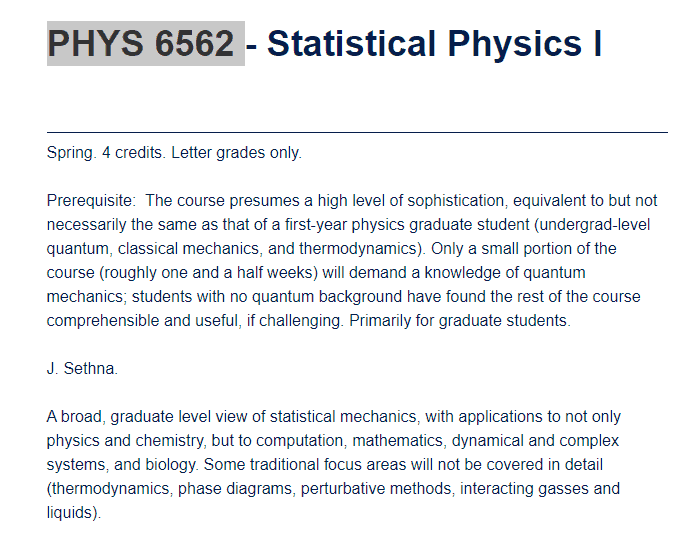Statistics-lab™可以为您提供cornell.edu PHYS6562 Statistical Physics信息论课程的代写代考和辅导服务!

PHYS6562 Statistical Physics课程简介
Based on the description provided, the course appears to be aimed at graduate students in physics or a related field. The course assumes a high level of sophistication, equivalent to that of a first-year physics graduate student. This suggests that students are expected to have already completed an undergraduate-level education in quantum mechanics, classical mechanics, and thermodynamics.
While a small portion of the course will require knowledge of quantum mechanics, the rest of the course appears to be designed to be accessible to students without a background in this area. However, it is still expected to be challenging for students due to the high level of sophistication required.
Overall, the course appears to be primarily aimed at graduate students in physics or a related field who are looking to deepen their understanding of these topics and build upon their undergraduate education.
PREREQUISITES
The course aims to provide a broad, graduate-level view of statistical mechanics, with a focus on applications beyond the traditional domains of physics and chemistry. The course content will cover not only the fundamental principles of statistical mechanics but also its applications to computation, mathematics, dynamical and complex systems, and biology.
While the course will cover the basics of thermodynamics, phase diagrams, perturbative methods, and interacting gases and liquids, these areas will not be covered in great detail. This suggests that the course will focus more on advanced topics related to statistical mechanics, rather than on basic introductory concepts.
Overall, the course appears to be designed for graduate students who have a strong foundation in physics, chemistry, or a related field, and who are interested in exploring the interdisciplinary applications of statistical mechanics. Students who are interested in pursuing research in areas such as computational science, mathematical biology, or complex systems would likely find this course particularly useful.
PHYS6562 Statistical Physics HELP(EXAM HELP, ONLINE TUTOR)
Exercise: Understanding test results. ${ }^6$. Consider a mammogram to diagnose breast cancer. Consider the following facts (the numbers aren’t exact but reasonable).
- $1 \%$ of women have breast cancer.
- Mammograms miss 20\% of cancers when that are there.
- $10 \%$ of mammograms detect cancer even when it is not there.
Suppose you get a positive test result, what are the chances you have cancer?
To determine the chances of having cancer given a positive mammogram test result, we can use Bayes’ theorem. Let A denote the event that a woman has breast cancer, and B denote the event that a mammogram test is positive.
From the given facts, we have:
- P(A) = 0.01 (1% of women have breast cancer)
- P(not A) = 0.99 (the complement of A)
- P(B|A) = 0.8 (mammograms miss 20% of cancers)
- P(B|not A) = 0.1 (10% of mammograms detect cancer when it is not there)
We want to find P(A|B), the probability of having breast cancer given a positive mammogram test result.
Using Bayes’ theorem, we have: P(A|B) = P(B|A) * P(A) / P(B)
where P(B) = P(B|A) * P(A) + P(B|not A) * P(not A) = 0.8 * 0.01 + 0.1 * 0.99 = 0.108
Therefore, we have: P(A|B) = P(B|A) * P(A) / P(B) = 0.8 * 0.01 / 0.108 ≈ 0.074 or about 7.4%
So, given a positive mammogram test result, the chances of having breast cancer are about 7.4%. It is important to note that a positive test result does not necessarily mean that a woman has breast cancer, and further testing and examination are usually required to confirm a diagnosis.
Exercise: Understanding test results. ${ }^6$. Consider a mammogram to diagnose breast cancer. Consider the following facts (the numbers aren’t exact but reasonable).
- $1 \%$ of women have breast cancer.
- Mammograms miss 20\% of cancers when that are there.
- $10 \%$ of mammograms detect cancer even when it is not there.
Suppose you get a positive test result, what are the chances you have cancer?
To determine the probability of having breast cancer given a positive mammogram test result, we need to use Bayes’ theorem. Let A be the event that a woman has breast cancer and B be the event that the mammogram test is positive.
From the given information, we have:
- P(A) = 0.01 (1% of women have breast cancer)
- P(not A) = 0.99 (the complement of A)
- P(B|A) = 0.8 (mammograms miss 20% of cancers)
- P(B|not A) = 0.1 (10% of mammograms detect cancer when it is not there)
Using Bayes’ theorem, we can calculate the probability of having breast cancer given a positive mammogram test result: P(A|B) = P(B|A) * P(A) / [P(B|A) * P(A) + P(B|not A) * P(not A)]
Substituting the given values, we get: P(A|B) = 0.8 * 0.01 / [0.8 * 0.01 + 0.1 * 0.99] = 0.074 or approximately 7.4%
Therefore, if a woman gets a positive mammogram test result, the chances of her having breast cancer are about 7.4%. However, this does not mean that she definitely has breast cancer, as there is still a significant chance that the positive test result is a false positive. Additional testing and evaluation are usually required to confirm a diagnosis.
Textbooks
• An Introduction to Stochastic Modeling, Fourth Edition by Pinsky and Karlin (freely
available through the university library here)
• Essentials of Stochastic Processes, Third Edition by Durrett (freely available through
the university library here)
To reiterate, the textbooks are freely available through the university library. Note that
you must be connected to the university Wi-Fi or VPN to access the ebooks from the library
links. Furthermore, the library links take some time to populate, so do not be alarmed if
the webpage looks bare for a few seconds.

Statistics-lab™可以为您提供cornell.edu PHYS6562 Statistical Physics信息论课程的代写代考和辅导服务! 请认准Statistics-lab™. Statistics-lab™为您的留学生涯保驾护航。